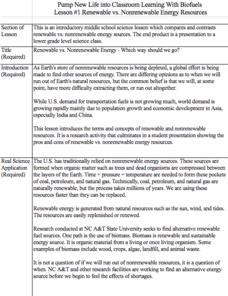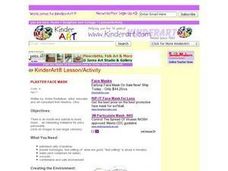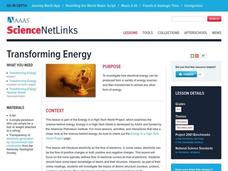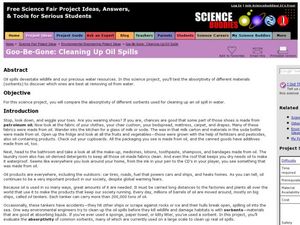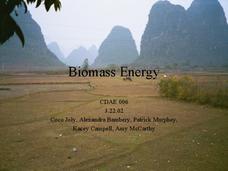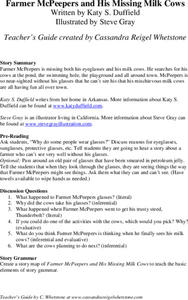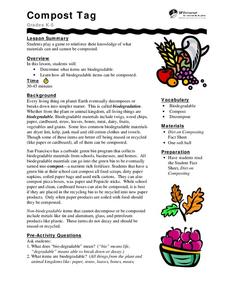National Institute of Open Schooling
Hydrocarbons
The vast majority of hydrocarbons humans use help fuel cars, homes, and provide energy. A comprehensive lesson teaches pupils all about hydrocarbons. From alkanes, alkenes, and alkynes to benzene, classes study the preparation of these...
National Wildlife Federation
An Energy Mix: Renewable and Nonrenewable Resources
What did the windmill say about renewable energy? I'm a BIG fan! Lesson three in the series of 12 has classes discuss potential and kinetic energy and then, in pairs, they complete a web quest over the different types of energy...
Kenan Fellows
Renewable vs. Nonrenewable Energy Resources
Is one type of energy inherently good or bad? Young scientists explore energy resources in a week-long unit. After extensive research, groups create powerful position statements and presentations supporting their energy resource of choice.
Curated OER
Sources of Energy
Fifth graders take a close look at how energy changes from one form to another within their surroundings. They also study the ten different sources of energy and determine which are renewable and which are non-renewable. This seven-page...
Curated OER
Made from Animals
Here is a terrific lesson for elementary schoolers on products that come from animals. In it, pupils discover that we get a lot more than just food from animals. After a class discussion and teacher-led demonstration, learners utilize...
Curated OER
Plaster Face Mask
The process may be difficult, but the end product will be worth it. Kids will love creating these plaster masks made from their own faces. If they can sit still long enough, they can become the model for their own masks. All the steps,...
Curated OER
It's a Gas! Or is it?
Oceanography enthusiasts are given a series of thought experiments to consider in order to relate the solubility of gases and solids to underwater volcanoes. It is not particularly engaging to perform these thought experiments. Choose...
Curated OER
Transforming Energy
Super detailed, this lesson will educate physical science learners about the flow of electrons. Begin by reviewing potential and kinetic energy with a moving pendulum, and then get them online to observe interactive websites about...
Curated OER
Cleaning up an oil spill
Small groups complete a science project involving cleaning up an oil spill. In this experiment, pupils use 4 different sorbents to discover which one absorbs the most oil. Afterward, they make a data table.
Curated OER
It's a Gas! Or is it?
Examine the effects of temperature and pressure on solubility and the states of matter of ocean water. Learners make inferences about the unique chemistry of ocean water at different depths. They engage in an activity related to...
Curated OER
Transportation Fuels Debate
Young scholars study the different transportation fuels. In this energy sources lesson students debate the merits of their fuel over others while working together in groups.
Curated OER
Saddam Hussein and Modern Iraq
Take your class through a moment in modern history in this presentation, which details the rise of Saddam Hussein and the dynamics between Iraq and its neighbors during the Persian Gulf War and the current Iraq war. Though slightly...
Curated OER
What Concepts are being presented
World War II, WWII, the Holocaust, the Rise of the Nazi Empire, Concentration Camps, the effect on children. The first 9 slides are of images and scenes of WWII, Black and white photography Slides 10 to 20 show present day photos of...
Curated OER
World Oil Reserves: Assignment
Understanding and analyzing data is a critical skill. Included here are three worksheets a list of countries with the largest oil reserves, a graph of the same, and an assignment. The class uses their data to create a bar chart then...
Curated OER
Residential Power System
Perform data analysis on energy consumption to apply algebraic expressions to the real world. Learners will write and solve equations that answer various questions from residential power use. They will collect data at home and calculate...
Curated OER
Cartoons in the Classroom: Conserve or Drill
To drill or to conserve? This question is the foundation of the political cartoons up for critical analysis in this well-composed worksheet. Learners will analyze two cartoons guided by background information and excellent questions for...
Curated OER
Biomass Energy
Consider biomass as an alternative energy source with this PowerPoint. Environmental science pupils discover the potential of converting gases produced by landfills into useful energy. They compare and contrast environmental and economic...
SF Environment
Pre-School Composting and Recycling!
You can never be too young to get involved in composting or recycling. Here is a lesson that has been made for the very littlest learners and it's all about the importance of conservation. They'll sort compostable and recyclable objects,...
Cassandra Reigel Whetstone
Farmer McPeepers and His Missing Milk Cows
Pair your reading of Farmer McPeepers and His Missing Milk Cows with the questions and activities provided here. Learners answer questions about the text, create story maps, put together brochures, relate math to the story, practice some...
SF Environment
Compost Tag
Composting is a great way to get children involved in recycling. First, they discuss how biodegradable products decompose to make compost. Then, they talk about what can and cannot be composted. They play a game similar to around the...
Carnegie Mellon University
Transportation
Teach your environmental studies, life science, or engineering class how an internal combustion engine works using the first few slides of the accompanying presentation. Then, focus in on the resulting carbon emissions. Finally, take a...
Curated OER
Chalk Chromatography
Your chemistry class is sure to love this experiment on column chromatography, as demonstrated with chalk sticks and felt tip markers. Pupils use sidewalk chalk (another inexpensive form of chalk stick) to demonstrate adsorption and the...
It's About Time
Oil and Gas Production
Would you consider a power failure a current event? This lesson uses multiple experiments, guided inquiry activities, and group discussions to cover the topics of oil and gas production. This is the seventh lesson in a series of eight.
Teach Engineering
Capillarity – Measuring Surface Tension
How do cohesion and adhesion work together? The third installment of a nine-part series teaches young scientists the difference between adhesion and cohesion. They also learn how cohesion and adhesion work together to cause capillary...
Other popular searches
- Petroleum Products
- Disadvantages of Petroleum
- Coal Petroleum Natural Gas
- Petroleum Geologist
- Energy Efficiency Petroleum
- Petroleum Hydrocarbon
- Petroleum Chemistry
- Petroleum Jelly
- Petroleum Distillation
- Carbon Petroleum
- Petroleum Jelly; Index Cards
- Petroleum Jelly on Leaves




